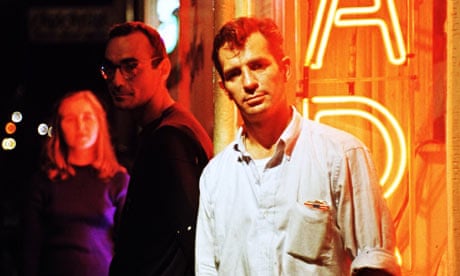Forty years ago today, Jack Kerouac died. Not for him the glorious blaze that's the proverbial price of a life lived too fast. At the age of 47, he may have died relatively young, but he didn't leave a good-looking corpse. Kerouac had retreated into the philosophical if not actual loneliness of the writer's life, and died in hospital after vomiting much of his vitality out into the toilet of the home he shared with his wife and mother in Florida, America's sunshine retirement capital.
Bloated, reactionary and guileless, his was a painful and undignified death, brought on my too much drink and dissolute living, played out in the presence of the mother whose apron strings he couldn't seem to cut, and the wife who didn't understand him. Venerated by his fans and dismissed by many critics (Truman Capote was probably the most memorably sniffy about his spontaneous prose-poetry and the work of the Beat writers at large: 'None of these people have anything interesting to say,' he said, 'and none of them can write, not even Mr Kerouac.' It 'isn't writing at all - it's typing.' But he did not want for detractors), Kerouac has divided opinion as to his literary merit since his ungainly demise. But has his time finally come round again?
The evidence against Kerouac is, on the face of it, overwhelming. As joyful as his lyrical, stream-of-consciousness prose could be, it wasn't, we are reminded, proper writing. For a counterculture legend, he could come across like a grumpy old man from a US sitcom; while his foil and pal Neal Cassady moved seamlessly from the 1950s Beat Generation to the hippy revolution of the 60s, Kerouac couldn't or wouldn't understand this brave new world. When Cassady, by now running with the new generation epitomised by Ken Kesey's Merry Pranksters, visited him in 1964, Jack doubtfully took LSD and ended up silently beating himself up over the perceived failings which saw him kicked out of the Merchant Navy.
But to accept all that as criticism of Kerouac is to misunderstand what he was all about. He never set himself up as the champion of a nation-changing revolutionary counterculture - he was just a kid from a blue-collar background who longed to write. While contemporaries such as Allen Ginsberg, William S Burroughs and Gary Snyder seemed to have an innate "otherness" that set them apart from the rank-and-file of post-war American society, Kerouac refused to fully excise the connections that hooked him to his fairly average working-class upbringing. Ginsberg was the bearded, dark-eyed nightmare ready to subvert the American dream with his shouty poems and alien sexuality; Kerouac seemed to remain the type of square-jawed college boy you could take home to your mother for Sunday lunch (assuming he was going easy on the sauce that day). Few of us could aspire to be Ginsberg, but we could all hope to be Kerouac. The fat, depressed, apparently antisemitic Jack Kerouac who died after throwing his guts up in the toilet in St Petersburg, Florida – that's not the Jack we like to remember. That's not the Jack buried beneath the flat headstone in the cemetery just outside the town of Lowell, about 30 miles outside of Boston, where Kerouac grew up.
Back in the late 90s I found myself in Boston and struck out for Lowell. It's a pretty, spacious red-brick former mill town, which honours Kerouac in a non-flashy kind of way. There's a small sculpture park comprising half a dozen monoliths on which were etched passages from Jack's work. The man in the tourist information bureau, upon selling me a couple of Kerouac books that I hadn't found in British bookshops, gave me a photocopy of a hand-drawn map showing some important sites – his old house, his school – and the location of his grave in the municipal Edson Cemetery.
It was a blazing hot July day, and I walked the few miles from the town centre to the cemetery, past white picket fences and well-tended yards. I found Jack's grave in the deserted cemetery. "Ti Jean", it said on it: his childhood nickname in Canuck patois, Little Jack. Previous well-wishers had left gifts of beer-bottle caps, unsmoked joints, key-rings, scrawled notes. When Kerouac was returned to his home to be buried on 24 October 1969, there were allegedly two old Lowellians outside the church. One asked whose funeral it was. "Jack Kerouac," said the other. The first ruminated for a moment then said, "Who's Jack Kerouac?"
Who was Jack Kerouac? Not the best writer in the world, but a writer nonetheless. Perhaps not the revolutionary hero some people think he wasn't very good at being, but which he wasn't actually trying to be. An ordinary guy thrust into sometimes extraordinary situations, trying to straddle the abyss between what was expected of him and what he wanted to be? An incredible humanist, wide-eyed at the possibilities of life? A man of confused but deep spirituality? That's what I got as I sat beside Jack's grave on that hot July afternoon.
A long-awaited movie adaptation of Kerouac's breakthrough book, On the Road, is due out next year, with Sam Riley, who played Ian Curtis in the Joy Division biopic Control, slated for the role of Jack's alter ego, Sal Paradise. Whether it reconciles the duality of Kerouac the legend and Kerouac the man – both of which have been found wanting in many regards – perhaps it does signal that we're on the road to a new and overdue appreciation of Jack Kerouac.

Comments (…)
Sign in or create your Guardian account to join the discussion